 Petzlover
Petzlover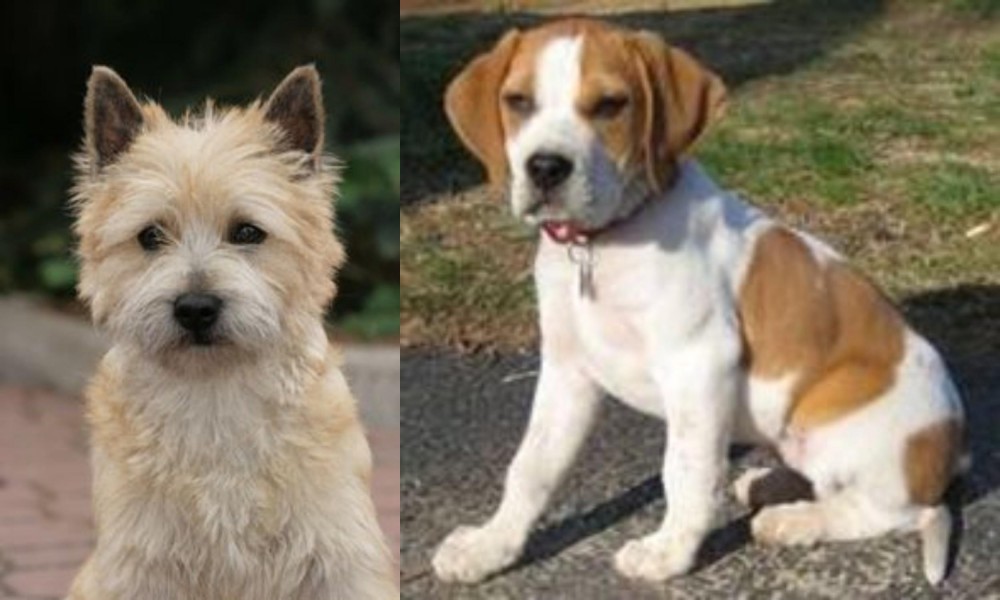 Cairn Terrier is originated from United Kingdom but Francais Blanc et Orange is originated from France. Cairn Terrier may grow 37 cm / 14 inches shorter than Francais Blanc et Orange. Cairn Terrier may weigh 28 kg / 61 pounds lesser than Francais Blanc et Orange. Cairn Terrier may live 7 years more than Francais Blanc et Orange. Both Cairn Terrier and Francais Blanc et Orange has almost same litter size. Both Cairn Terrier and Francais Blanc et Orange requires Low Maintenance.
Cairn Terrier is originated from United Kingdom but Francais Blanc et Orange is originated from France. Cairn Terrier may grow 37 cm / 14 inches shorter than Francais Blanc et Orange. Cairn Terrier may weigh 28 kg / 61 pounds lesser than Francais Blanc et Orange. Cairn Terrier may live 7 years more than Francais Blanc et Orange. Both Cairn Terrier and Francais Blanc et Orange has almost same litter size. Both Cairn Terrier and Francais Blanc et Orange requires Low Maintenance.
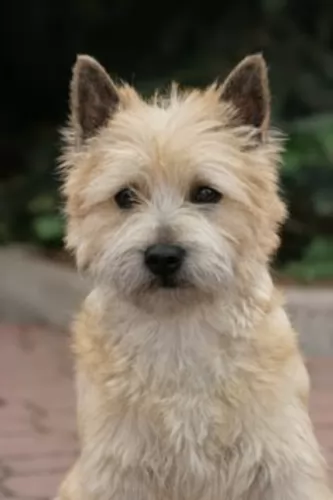 The Cairn Terrier originates in the Scottish Highlands. This feisty little dog was given the name Cairn, as he used to hunt prey between the Scottish cairns. At first the dog was grouped as a ‘Skye Terrier’way back in the 1900s with the Scottish and West Highland White Terrier. Then the different breeds began to be bred separately.
The Cairn Terrier originates in the Scottish Highlands. This feisty little dog was given the name Cairn, as he used to hunt prey between the Scottish cairns. At first the dog was grouped as a ‘Skye Terrier’way back in the 1900s with the Scottish and West Highland White Terrier. Then the different breeds began to be bred separately.
The name Cairn Terrier didn’t appear in print till 1887. It was in 1912 that the Kennel Club of the United Kingdom recognized the Cairn Terrier.
 The Chien Francais Blanc et Orange is one of the three versions of the Chien Francais. There is the Francais Blanc et Noir and the Francais Tricolor. These scent hounds were distinguished by their colors. The Francais Blanc et Orange like the other two, was a descendent of a variety of English and French hunting hounds, including the Hound of Saintonge.
The Chien Francais Blanc et Orange is one of the three versions of the Chien Francais. There is the Francais Blanc et Noir and the Francais Tricolor. These scent hounds were distinguished by their colors. The Francais Blanc et Orange like the other two, was a descendent of a variety of English and French hunting hounds, including the Hound of Saintonge.
The Hound od Saintonge is extinct but has several breeds coming from his line including the Billy – a pointer. Similar to the Francais Blanc et Orange, the Billy hunted in packs. Coming from these roots the Francais Blanc et Orange was developed around the 1900’s. Many considers the Chien Francais trio to be the Newest and Rarest French Hounds. The Francais Blanc et Orange is a white and orange hound, considered to be the rarest of the three. They were developed by crossing English Foxhounds with French Scent Hounds.
The Francais Blanc et Orange is a born hunter and a good one at that. In his pack he is happy and superbly equipped for the hunt. His vision and scenting skills are unsurpassed. They can cover a large expanse of territory in a very short period of time. They were known for hunting large boar and deer as well as small prey like foxes or rabbits. They were recognized as a separate breed by the UKC in 2006 but are not recognized by the AKC.
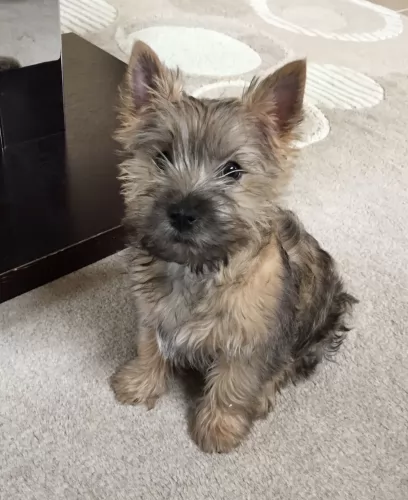 The small sturdily built working Terrier is intelligent and courageous. Bright-eyed, he is small and active and he just loves to work- and party hard with his human family. You’ll see if you’ve got a ball you want to throw for him, his tail is quivering in anticipation and his ears are erect and alert to any noise. He is smart, independent and courageous.
The small sturdily built working Terrier is intelligent and courageous. Bright-eyed, he is small and active and he just loves to work- and party hard with his human family. You’ll see if you’ve got a ball you want to throw for him, his tail is quivering in anticipation and his ears are erect and alert to any noise. He is smart, independent and courageous.
The Cairn Terrier has a tough, weather-resistant coat that can be any color but not white. He has a waterproof double coat – the outer one being wiry while the undercoat is soft. You’ll find the coat in man colours such as grey, black, red and brindle with dark points on the ears and muzzle.
The interesting thing with a Cairn is that when you get a puppy, you can’t be sure what color he will end up being as it changes over the years. The ears are fox-like, small and erect, and the natural medium-to-short tail is held straight out.
 The Francais Blanc et Orange is a large , muscular and lean hunting dog, a typical pack hound out of France. They have a flat to somewhat domed head, long legs, and dropped, long ears and a square muzzle. The nose is either orange-brown or black and has large nostrils. Their eyes are deep set, dark and widely spaced. They have a deep chest which leads to their propensity toward the situation of bloat. This breed is smaller than the Chien Francais Blanc et Noir that hunts in packs. The skin is the fur’s color. They are athletic and display tremendous perseverance.
The Francais Blanc et Orange is a large , muscular and lean hunting dog, a typical pack hound out of France. They have a flat to somewhat domed head, long legs, and dropped, long ears and a square muzzle. The nose is either orange-brown or black and has large nostrils. Their eyes are deep set, dark and widely spaced. They have a deep chest which leads to their propensity toward the situation of bloat. This breed is smaller than the Chien Francais Blanc et Noir that hunts in packs. The skin is the fur’s color. They are athletic and display tremendous perseverance.
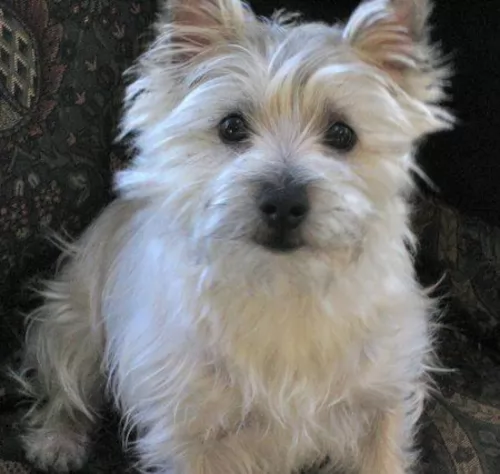 The Cairn Terrier is a fearless, jaunty little dog, known for his courageous spirit and inquisitive nature. He may be small, but he is stubborn. He will respond well to training and socialization which will turn him into the most awesome pet for families. He can make a wonderful friend and playmate for children too. Socialization and training ensures he gets on well with other pets in the household too.
The Cairn Terrier is a fearless, jaunty little dog, known for his courageous spirit and inquisitive nature. He may be small, but he is stubborn. He will respond well to training and socialization which will turn him into the most awesome pet for families. He can make a wonderful friend and playmate for children too. Socialization and training ensures he gets on well with other pets in the household too.
He is small and energetic, and therefore not the kind of dog you can ignore in terms of exercise. He’ll need a good walk every day and he just loves to chase a ball as it takes him back to the days when he was used to chasing- and catching mice.
He isn’t your typical lap-dog at all and with the right care he becomes a devoted, loyal and loving companion.
 They are not exactly child oriented dogs as they are so oriented toward the hunt and the pack. With serious exercise and mental stimulation, they can become a good family dog, but it is not in their instincts.
They are not exactly child oriented dogs as they are so oriented toward the hunt and the pack. With serious exercise and mental stimulation, they can become a good family dog, but it is not in their instincts.
hunting in packs/scent and vision
He is not suited for apartment life and does need a large, fenced yard to run and play. Being a scent hound, he will constantly be sniffing for a trail to follow so put him to work.
The breed is highly intelligent and easily trainable.
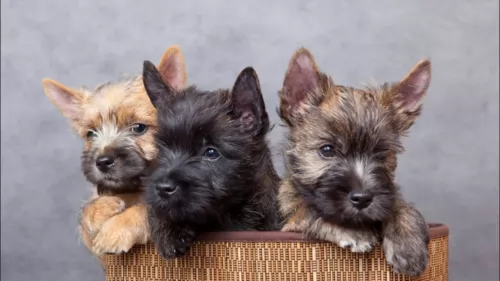 The Cairn Terrier is a robust little dog, and with good care can reach 14 years of age and even older. However, with every dog breed there are some health concerns particular to that breed. With your Cairn Terrier look out for a disease known as Globoid cell leukodystrophy (GCL).
The Cairn Terrier is a robust little dog, and with good care can reach 14 years of age and even older. However, with every dog breed there are some health concerns particular to that breed. With your Cairn Terrier look out for a disease known as Globoid cell leukodystrophy (GCL).
Known also as Krabbe Disease, Globoid cell leukodystrophy (GLD) is a rare but fatal disease. It is caused by a mutation on the dog’s DNA. There is abnormal processing of an enzyme needed for the production of myelin, a substance that protects the nerves in the brain and spinal cord. The dog is weak, it has tremors and isn’t co-ordinated. The Cairn Terrier is a breed of dog more susceptible to GCL.
Your Cairn Terrier may well suffer with joint diseases. These diseases, such as luxating patella which is about loose knee joints, and hip dysplasia which is a degenerative hip disease, can cause plenty of pain and discomfort for your pet.
Glaucoma is an eye disease where there is pressure on the eye, causing inadequate fluid drainage. Without treatment, there can be damage to the optic nerve which can lead to blindness.
 As with any dog with log floppy ears, infection is always a concern. Make sure you clean them after every hunting trip, romp or play session.
As with any dog with log floppy ears, infection is always a concern. Make sure you clean them after every hunting trip, romp or play session.
Like many large dogs the Blanc et Orange has a propensity to acquire hip dysplasia. It is known that joint dysplasia has a genetic component and should be screened for. Can cause lameness and arthritis.
This is a real danger for the Blanc et Orange. They are deed chested and these are the dogs that are most likely to get bloat. The stomach is twisted and distended. It can be fatal if not treated quickly.
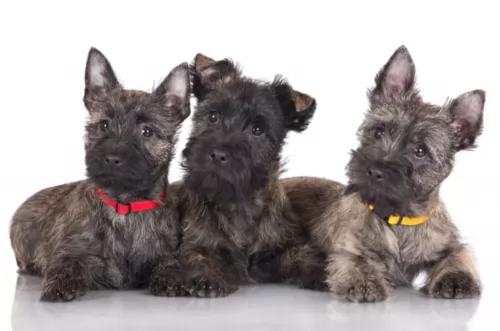 The Cairn Terrier sheds very little and the coat is easy to groom. Give him a thorough brushing twice a week to rid him of loose hairs. Some trimming will be needed as the coat can become shaggy and unruly.
The Cairn Terrier sheds very little and the coat is easy to groom. Give him a thorough brushing twice a week to rid him of loose hairs. Some trimming will be needed as the coat can become shaggy and unruly.
Brush his teeth at least 2 or 3 times a week to prevent tartar build up that can lead to bacteria, gum disease and possible tooth loss.
The Cairn Terrier is small but he is an active dog and therefore needs to be on a high-quality dog food. If you feed him a commercially manufactured food, make sure its appropriate to his age, size and activity levels.
He is a small dog so you want to be careful about not letting him become overweight. Try and alternate his commercially manufactured food with some home-made rice, vegetables and meat and also include some raw meat in from time to time. This is of particular importance as chronic skin allergies are common in all terrier breeds. Make sure that there is always a clean bowl of fresh water available to him day and night.
 Until about 18 months of age feed between 1 and 1.5 cups of high quality puppy, dry food, made for sporting dogs. Divide this into 3 meals per day.
Until about 18 months of age feed between 1 and 1.5 cups of high quality puppy, dry food, made for sporting dogs. Divide this into 3 meals per day.
3 cups day – After 18 month feed 3 cups per day of a high quality, adult dry food made for sporting dogs. Divide this into 2 meals per day.
Outstanding scent and vision
Even though they are warm and welcoming to people, these are very serous dogs. They usually live outside in packs as they are an incredible pack animal. All they want in life is to hunt. However, if they cant hunt they need at least a couple hours per day od vigorous exercise. They are obviously better off in a rural environment than a city one. Put him in field trails, scent trials, barn hunt and playing fetch.